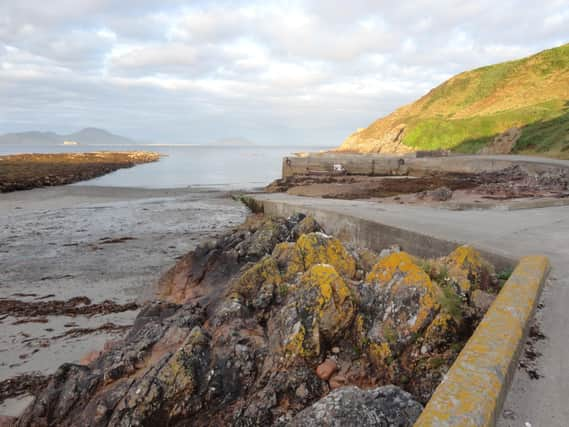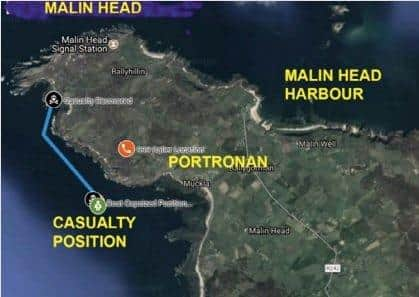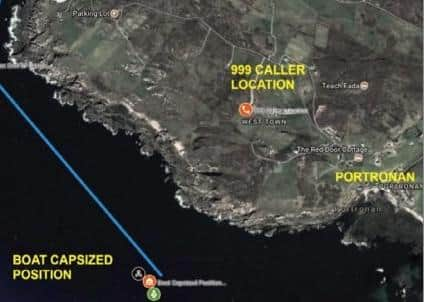Lost mobile a factor in Portronan tragedy which claimed the lives of Gerry ‘Malin’ Doherty and Thomas Weir off Inishowen, Marine Accident Investigation Board report finds


Gerry ‘Malin’ Doherty, aged in his 60s, and Thomas Weir, aged 16, lost their lives when their boat sank near Portronan on July 17, 2018.
A Marine Accident Investigation Board (MAIB) report - published after a lengthy investigation into what went wrong - has concluded a number of factors contributed to the severity of the incident.
Advertisement
Hide AdAdvertisement
Hide AdThe analysis describes how Mr. Doherty, the Skipper, set out on a fishing trip with Thomas and another crew member in his mid-40s who survived, at around 8 a.m. on the morning of Tuesday, July 17, 2018.


After fishing for a few hours while the Fletcher Dorado Ski boat drifted with the tide, an unsuccessful attempt was made to restart the engine.
Anchoring the boat in order to fix the problem the crew were suddenly hit by a series of waves, the boat was quickly swamped, and tragedy unfolded.
“A wave washed over the stern flooding the boat and as the crew made an emergency call on a UK mobile phone a second wave washed over the stern and the boat foundered.
Advertisement
Hide AdAdvertisement
Hide Ad“While the emergency call was being put through by Emergency Call Answering Service (ECAS) to the Coast Guard (CG) the mobile phone fell into the water and there was no further contact with the crew,” the report states.


The MAIB points out that there were three life jackets on board but only Thomas, who did not survive the accident, was wearing one when he was recovered.
In a narrative of what happened once the waves struck the MAIB report states: “The boat submerged to just below the surface, supported by air inside the cabin. Crewmember No.2 was wearing a personal floatation device (PFD) and drifted away from the boat.
“The Skipper and Crewmember No.1, without PFDs, clung to fenders on the side of the boat. Shortly afterwards the Skipper let go of the boat and drifted away face downwards.
Advertisement
Hide AdAdvertisement
Hide Ad“Crewmember No.1 clung on to the boat for about 5 hours. When he saw a boat in the distance he began shouting and his shouts were heard by a person ashore and the Skipper of a boat, both of whom raised the alarm.
“Lifeboats, Search and Rescue (SAR) helicopter and Coast Guard Units were tasked. Crewmember No.1 who was clinging to the boat was picked up by a fishing boat and Crewmember No.2 who was wearing a PFD was rescued by the helicopter.
“The body of the Skipper was found on the shore about 1.5 km away. The crewmember rescued by helicopter was taken to Altnagelvin Hospital, Co Derry. He passed away later that evening,” the report states.
The marine accident authority says several factors contributed to the tragedy.
Advertisement
Hide AdAdvertisement
Hide AdAmong these were that ‘the crew had not planned the voyage sufficiently and were not prepared for this emergency’ and that ‘anchoring this type of craft by the stern made it much more susceptible to swamping in any type of sea’.
Another factor was the lack of a VHF radio which the MAIB recommends as the primary means of contacting emergency services.
“An effective method of indicating distress was not aboard the vessel. A mobile phone should not be relied on as the primary method of contacting the emergency services,” it concludes.
The full report provides transcripts of a number of various emergency telephone conversations involving the crew, the ECAS stations at Navan and Ballyshannon and the Coast Guard.
Advertisement
Hide AdAdvertisement
Hide AdIt concluded that ‘insufficient flexibility’ within the land-based ECAS system meant that the Coast Guard did not get all the information about the emergency promptly enough.
“After the 10:16 hrs. emergency call the Coast Guard acted in accordance with the information it had to hand.
“The information it had regarding the incident, according to the Coast Guard was insufficient to task assets for a search.
“There was enough information in the ECAS recording of the emergency call for the Coast Guard to initiate Search and Rescue (SAR) operations shortly after 10:16 hrs.
Advertisement
Hide AdAdvertisement
Hide Ad“This information was not transferred to the Coast Guard due to: (i) The operators at the Coast Guard on the initial emergency call not receiving sufficient information to commence a SAR operation; (ii) Restrictive procedures in ECAS which were not sufficiently flexible for a situation which required the ECAS operators to be more proactive in transferring all the information available to the Coast Guard.
“Because the information in the recording of the emergency call was not transferred shortly after 10:16 hrs. the Casualties were in the water for five hours.
“This increased the severity of the incident.
“Marine communications are very different from land-based communications and the ECAS system is a land-based emergency call answering system with limitations for use at sea,” the investigation concluded.